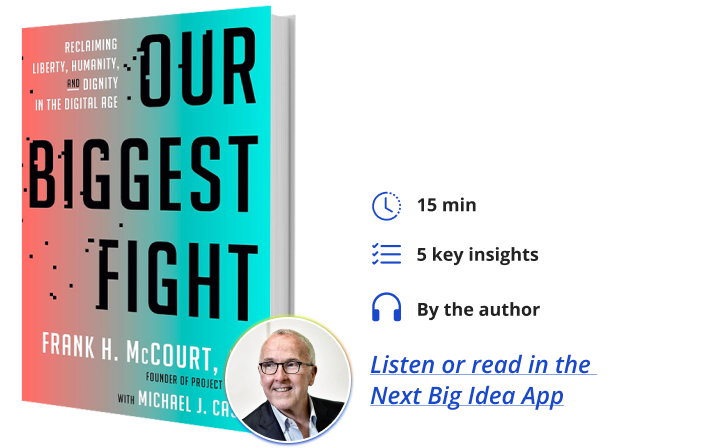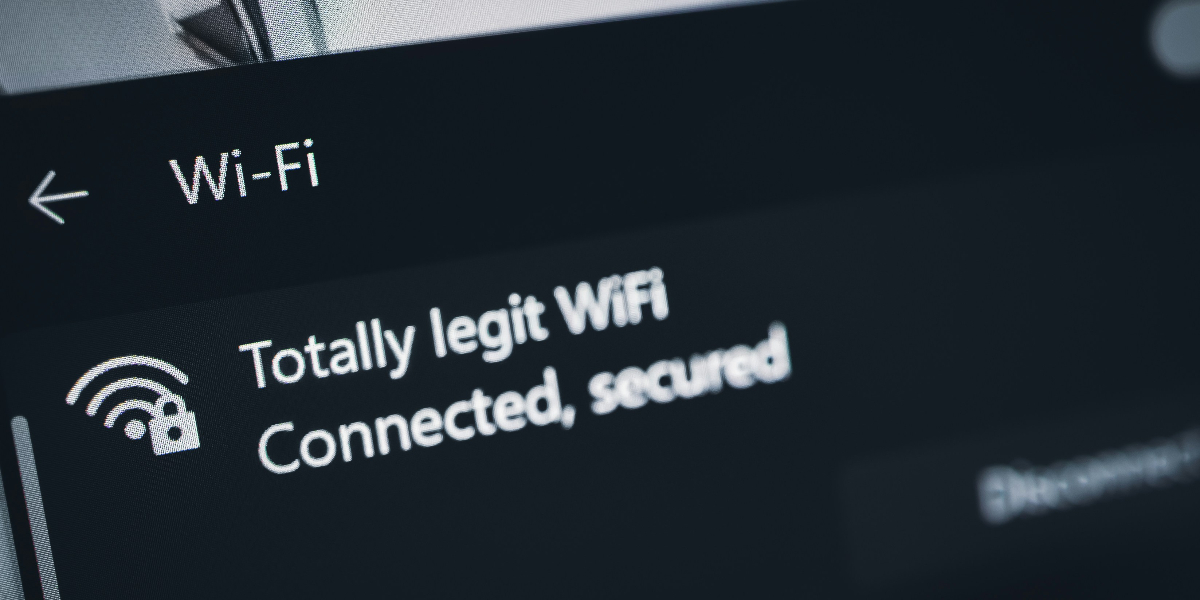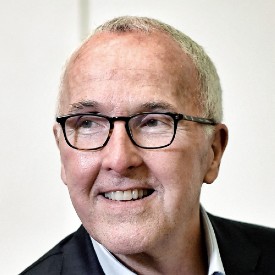Frank McCourt is the executive chairman of McCourt Global, a private family investment firm. He is also the founder and executive chairman of Project Liberty, a broad-based effort to build a better web for a better world. The project includes the development of an open internet protocol (the Decentralized Social Networking Protocol), which shifts data rights from platforms to people.
Michael Casey is Chief Content Officer at the CoinDesk media company, host of the Money Reimagined podcast, and the Chairman of the Consensus conference. He has worked as a journalist, including eighteen years with Dow Jones and The Wall Street Journal, and was a founding staffer at MIT’s Digital Currency Initiative.
Below, Frank shares five key insights from his new book with Michael, Our Biggest Fight: Reclaiming Liberty, Humanity, and Dignity in the Digital Age. Listen to the audio version—read by Frank himself—in the Next Big Idea App.

1. The internet is broken.
Despite the connectivity and conveniences today’s internet provides, its current user experience is broken. The tech that underpins our daily lives is doing real damage. It’s fueling a youth mental health crisis, incentivizing the spread of misinformation and inflammatory content, breaking down civil discourse, and undermining our democratic institutions. These destructive trends all connect back to a corrupted and disabled information system.
From my perspective as a fifth-generation builder, the problem starts with the web’s basic architecture. For more than 130 years, my family has been developing infrastructure in America, starting with roads in the late 19th century and, eventually, the fiberoptic systems that enabled the internet back in the 1990s. We have an infrastructure and engineering problem; a design deficiency. The internet’s flawed design is the root cause of incredible harm.
The problems we’re seeing today are not an accident. It’s what happens when technology is co-opted and corrupted in ways that prioritize a few platforms, rather than the people who use it.
2. It doesn’t have to be this way.
We can change how the internet works. We can do this by shifting its power from platforms to people, returning control of data to individuals, giving us a voice in how platforms and applications are built, and enabling everyone to benefit economically from the data and content we’re creating.
This isn’t a pipe dream; it’s a natural next step. The first generation of the internet was enabled by a protocol called TCP/IP. The second generation, or the World Wide Web, was enabled by HTTP, which we use every day. Why not create a new protocol with a set of new operating rules?
“This protocol was designed to return ownership and control of data to individuals.”
With Project Liberty, we’ve developed and released an open, decentralized social networking protocol, called DSNP. This protocol was designed to return ownership and control of data to individuals. At the same time, this protocol gives developers the opportunity to build amazing new apps utilizing that data, but with our permission and on our terms. DSNP is available to anyone and stewarded by the nonprofit Project Liberty Foundation. It is providing the foundation for a new, healthier digital ecosystem. Apps on this new protocol will be interoperable. Our data and our social graphs will be portable. The platforms of the future would have to accept our terms and conditions for using our data, not the other way around.
If we can treat the internet’s flaws as an engineering problem and fix them, then we can begin to solve some of the societal problems the internet is creating and making worse. Most importantly, upgrading the internet will help leverage technology to benefit humanity.
3. Data is personal.
When you hear the word “data,” think “personhood.” We’re now living in a digital age, when everything we do is impacted by technology. We all search the internet. We all shop online. We all have smart devices in our pockets, cars, and homes. All of the tools and devices we use scrape our information and hand it over to a few giant platforms that decide what to with it. The things they’re doing aren’t optimized for society or humanity; they’re optimized to keep us online, to show us more ads, and to generate more revenue. Too often, we think of data-scraping as just a part of daily life. Too many people accept that “we’re the product,” even though we can break free from this dynamic and access great tech that doesn’t exploit, outrage, and addict us for profit.
We need to merge in our minds the notion of the biological us and the digital us. Big Tech is using their autocratic, centralized surveillance technology to suck the soul out of each of us. These platforms are dehumanizing us. The internet can do wonderful, marvelous, awesome things for humanity—if it’s redesigned. We need to put human beings at the center, and have the technology embrace and embed the values we care about as individuals and as a society.
4. A decentralized web is good for prosperity.
Already the Big Five tech companies are worth trillions of dollars. That amount of wealth is unprecedented in human history. In the next generation of the internet, that number is undoubtedly going to grow. We know data is valuable.
“A new set of digital property rights would unleash massive economic innovation.”
Now imagine a world where the value we create online is shared with individuals, instead of hoarded by platforms; where we get to decide what to do with our data; and where we get to participate in the value we help create. A new set of digital property rights would unleash massive economic innovation and growth, generating new ideas, new wealth, and new opportunities at a rate and scale we’ve never seen. This isn’t a matter of stripping wealth from a few companies; it’s a matter of fueling unbelievable growth and progress, not just socially but economically. This would give every person who uses the internet the ability to participate and benefit in new ways.
5. Time is of the essence.
Look at what’s happening. The Big Five tech companies are all elbowing each other out of the way to be the dominant player in the next phase of this next big thing. This is especially clear now that we’ve entered the AI age. If they have their way, we’ll all double down on the existing model of the internet—giving these centralized platforms more control, more data, and more power with generative AI. We’ll be exploited and excluded even further.
We need to make a different choice and we need to make it soon. If you ask somebody right now, “Do you think your kids will have a better life than you?”, polls show that most people will say no. If you ask the kids, they definitely don’t think their lives are going to be better than their parents’ lives. We are dangerously off course. If we don’t seize the moment, we’re going to be dragged into a future that none of us wants.
Sometimes it takes a crisis for people to focus on and fix a problem. A crisis can be an opportunity, and that’s where we are right now. I am hugely optimistic that if we seize this moment to redesign the internet—if we prioritize people; give individuals agency and control over their data; and return personhood to people—our best days are before us.
Getting there is, indeed, our biggest fight.
To listen to the audio version read by author Frank McCourt, download the Next Big Idea App today:
































